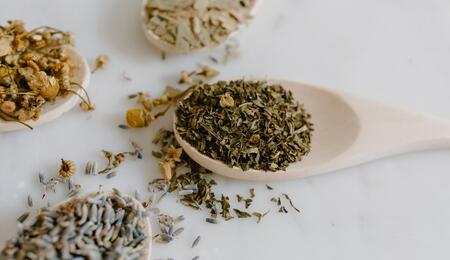All About CBD Tea

What's better than a warm cozy drink in the winter? CBD tea is like any other tea in the world but sprinkled with cannabidiol (CBD), the non-intoxicating compound extracted from hemp. Billed as an excellent relaxant, CBD tea can also help aid numerous health conditions. The concoction can be sweetened with honey or sugar or enjoyed with a snack after lunch or dinner. Use it to relieve stress or as a nighttime fix for better sleep.
CBD is available in various products such as topicals, gummies, oils, tinctures, and capsules. This list also features the type of beverage known to be the national drink in England: tea.
CBD tea drinks can contain various concentrations of CBD and are billed by manufacturers for their many health benefits.
Hemp and cannabis in the form of tea have found application in traditional medicine for millennia to treat various medical conditions and ailments. Today, there are different types of CBD tea on the market, often mixed with other herbs and ingredients. It's also fairly easy to prepare CBD tea yourself, so keep reading to find out more!
What types of CBD tea are there?
CBD teas are available in an array of flavors and formulas. Extra ingredients with proven health benefits such as chamomile for sleep or mint to release congestion are often combined with CBD teas, therefore, consumers can choose the variety they feel is best for them.
Brands selling CBD teas usually offer their product in individual tea bags or sachets. The product label contains information on the concentration of CBD and any other additional herb used in the making. As is the protocol with other regulated foods and beverages infused with cannabis, CBD teas must be checked free of contaminants.
CBD tea products can contain trace amounts of THC, but that is usually nowhere near enough to intoxicate a person and make them feel "high." But it may still be enough THC so that it shows up in drug tests.
In legal states, cannabis teas can contain sufficient amounts of both CBD and THC.

What are some of the most famous CBD tea brands?
CBD tea is a market on the rise where manufacturers come forward with innovative tea formulas.
For example, CBD tea from American Shaman is pretty unique as the concoction is similar to sparkling soda-like beverages. One of their four flavors is chamomile, an excellent choice to kick out stress from the body and relax.
Another go-to brand for anti-stress tea is Glow, which also has four options. One of their best tags is Glow Calm.
A can of American Shaman sparkling tea contains 10 mg of CBD oil, while brands like Buddhas contain 5 mg water-soluble CBD per cup.
Mixing chamomile, peppermint, and vanilla flavors, Green Roads Chamomile is one of the tastiest teas out there.
Last but not least, everyone who enjoys a good cup of tea should also try something from the rich array of options available at the Brothers Apothecary. Some of their types are a bit unusual, such as Mystic Kava Root, Highbiscuus, or Cosmic Cleanse. So, there's plenty of room to experiment with tastes, flavors, and effects.
How to prepare CBD tea?
Making an online order of your favorite tea is always the quickest option, however, CBD tea is pretty easy to make all by yourself, too. Given that you have the key ingredient to prepare this particular type of tea: CBD oil.
The most simple way to prepare CBD tea is just to insert a few drops of CBD oil into your concoction. Ideally, you will use water-soluble CBD oils since oil doesn't mix well with water. Water-soluble CBD oils have smaller particles and are easier to bind with water.
If you don't have a water-soluble form of CBD, use milk to add to your tea. Just like the British do. Milk should help the oil efficiently bind with the beverage.
Preparing a readily-available CBD tea is pretty straightforward as well. Here's how to go about it:
- Boil water at a temperature of 185 degrees Fahrenheit
- Switch off the heat once bubbles start to appear
- Add the CBD tea bag and wait up to 5 minutes or up to 15 minutes. It will say on the package when it is best to remove the bag.
- For green and black teas: 1-2 minutes is enough time to soak the teabag. If you keep it too long, the tea will be too bitter.
- Add sugar or honey as you prefer.

What are the health effects of CBD tea?
Like other CBD products, CBD tea is commonly used for stress relief, relaxation, and promoting a good night's sleep. Some users report that CBD tea also helps them treat pain or manage symptoms of mental health conditions such as anxiety or PTSD.
An added value for people who find comfort in CBD medicines is that CBD tea is quite affordable. Supplying a package of tea can cost as little as $5 and can significantly reduce medical costs.
Using herb supplements typically takes more time to generate the desired effects in the body, and if you are willing to give it a go with CBD tea, it can also result in a reduced reliance on drugs that often come with unpleasant or harmful side effects.
What are some potential risks?
Although CBD tea will not cause a person to feel high, the concoction is likely to slow down the body and cause sleepiness. Therefore, it's wise to follow some general advice on CBD consumption. Prepare and use it in the evening when all work is done. Don't drive after you take your tea. Nor operate a piece of machinery, both of which may require your full attention and alertness.
If you are taking any prescription drugs, it's best to consult a doctor on whether consumption of CBD products is recommended. Although more research is needed in this direction, it's known that CBD interacts with other drugs and can alter their effect in the body, which in some cases may arise complications.
What research on CBD says?
Scientists are still investigating how CBD products, including tea varieties, can help support health and wellbeing. Some of the research findings are promising and appear to confirm what user self-reporting and anecdotal evidence previously suggested.
A 2019 systematic review confirms CBD has antipsychotic, antidepressant, and pro-cognitive qualities. CBD can be beneficial in treating mental health conditions such as anxiety, while more research is needed to gauge whether it can be therapeutic for more severe conditions such as schizophrenia.
More research says that CBD may help with arthritis pain. At the same time, several animal studies have hinted at the anti-inflammatory effects of the cannabinoid and specifically its ability to prevent neurological damage.
Whether some of this research is reconfirmed, in the future, we may use tea and other CBD-based medicines to soothe diseases such as Alzheimer's and Parkinson's.





